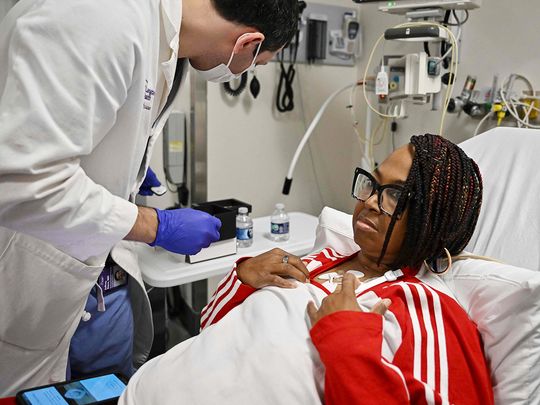
Alabama woman doing well after gene-edited pig kidney transplant: "It's like a new beginning"
Towana Looney, a 53-year-old Alabama woman, is now free from years of dialysis after receiving an experimental pig kidney transplant last month.
HealthWatch
Alabama woman doing well after gene-edited pig kidney transplant: "It's like a new beginning"
December 17, 2024 / 10:55 AM EST / CBS/AP
A 53-year-old Alabama woman is now free from years of dialysis after receiving a pig kidney transplant last month.
Towana Looney, who is recovering from the procedure, is the fifth American given a gene-edited pig organ — and notably, she isn't as sick as prior recipients who died within two months of receiving a pig kidney or heart.
"It's like a new beginning," Looney told The Associated Press. Right away, "the energy I had was amazing. To have a working kidney — and to feel it — is unbelievable."
Looney's surgery marks an important step as scientists get ready for formal studies of xenotransplantation — the use of an animal organ for transplant — expected to begin next year, said Dr. Robert Montgomery of NYU Langone Health, who led the highly experimental procedure.
More than 100,000 people are on the U.S. transplant list, most of whom need a kidney. Thousands die waiting and many more who need a transplant never qualify. Now, searching for an alternate supply, scientists are genetically altering pigs so their organs are more humanlike.
This research has been decades in the making and could help many others who need organs, said CBS News chief medical correspondent Dr. Jon LaPook, who is also a professor of medicine at NYU Langone.
"Just in the last year now, we have these xenotransplantations, which means you're having an animal organ and it's going into a human," LaPook said on "CBS Mornings Plus" Tuesday. "The interesting thing here is what they did is they fiddled with the gene. So there were, like 10 gene edits that made the pig kidney more compatible with humans. They put it in, and it's working."

Looney is recuperating well after her transplant, which was announced Tuesday. She was discharged from the hospital just 11 days after surgery to continue recovery in a nearby apartment although temporarily readmitted this week while her medications are adjusted. Doctors expect her to return home to Alabama in three months. If the pig kidney were to fail, she could begin dialysis again.
"To see hope restored to her and her family is extraordinary," Dr. Jayme Locke, Looney's original surgeon who secured Food and Drug Administration permission for the Nov. 25 transplant, told the AP.
Looney's need for a kidney follows a long health journey. In 1999, Looney donated a kidney to her mother, but a complication during pregnancy caused high blood pressure that damaged her remaining kidney, which eventually failed. It's incredibly rare for living donors to develop kidney failure although those who do are given extra priority on the transplant list.
But Looney couldn't get a match — she had developed antibodies abnormally primed to attack another human kidney. Tests showed she'd reject every kidney donors have offered.
"She ended up being on dialysis for the last eight years, on the renal transplant list for seven years, but she has sort of unusual antibodies that made her not a good donor recipient candidate for 99.99% of potential donors," LaPook explained.
Then Looney heard about pig kidney research at the University of Alabama at Birmingham and told Locke, at the time a UAB transplant surgeon, she'd like to try one. In April 2023, Locke filed an FDA application seeking an emergency experiment, under rules for people like Looney who are out of options.
The FDA didn't agree right away. Instead, the world's first gene-edited pig kidney transplants went to two sicker patients last spring, at Massachusetts General Hospital and NYU. Both also had serious heart disease. The Boston patient recovered enough to spend about a month at home before dying of sudden cardiac arrest deemed unrelated to the pig kidney. NYU's patient had heart complications that damaged her pig kidney, forcing its removal, and she later died.
Those disappointing outcomes didn't dissuade Looney, who was starting to feel worse on dialysis but, Locke said, hadn't developed heart disease or other complications. The FDA eventually allowed her transplant at NYU, where Locke collaborated with Montgomery.
Even if her new organ fails, doctors can learn from it, Looney said: "You don't know if it's going to work or not until you try."
Blacksburg, Virginia-based Revivicor provided Looney's new kidney from a pig with 10 gene alterations. Moments after Montgomery sewed it into place, the kidney turned a healthy pink and began producing urine.
Looney was initially discharged on Dec. 6, wearing monitors to track her blood pressure, heart rate and other bodily functions and returning to the hospital for daily checkups before her medication readmission. Doctors scrutinize her bloodwork and other tests, comparing them to prior research in animals and a few humans in hopes of spotting an early warning if problems crop up.
"A lot of what we're seeing, we're seeing for the first time," Montgomery said.
During a visit last week with Locke, who now works for the federal government, Looney hugged her longtime doctor, saying, "Thank you for not giving up on me."
"Never," Locke responded.






